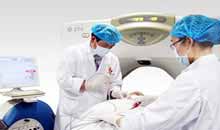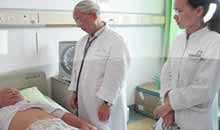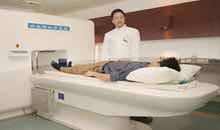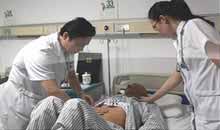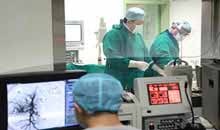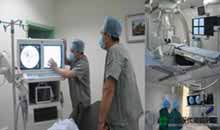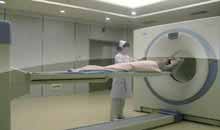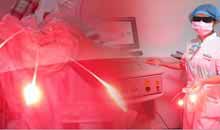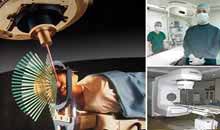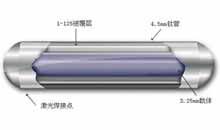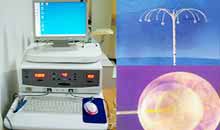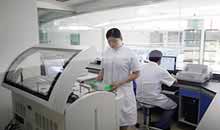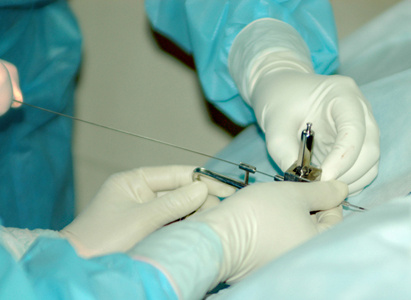
A latest study published in conjunction with the Annual Meeting of American Society of Clinical Oncology (ASCO for short) in year 2013 showed that adequate and safe dose of radiation of seed implantation can achieve good treatment effect for prostate cancer as well as reduce high grade toxicities. The study was conducted by Japanese Prostate Cancer Outcome Study by assessing its feature, efficacy and safety.
The study was started from July 2005 and 6,972 cases were enrolled in until December 2012, among which 2,341 patients were evaluated. Patient’s background, cancer character, treatment feature such as combination of other therapy, treatment efficacy with PSA level, post dosimetric information and voiding symptoms, etc were investigated for assessment of efficacy of iodine-125 seed implantation therapy. The results showed that 99.0% of the cases were performance status 0 (ECOG criteria). CT scan based first post therapeutic month dosimetry revealed that prostatic mean V100 and D90 for the cases treated with seed alone were 94.8% and 160.7 Gy, respectively ( Note: V indicates the volume of specified target or tissue where prescribed percentage dose reached. D means the percentage of required dose that the target area or tissue actually received.) As for adequate control of radiation dose at rectum (mean R100 = 0.3 cc) and urethra (mean D5 = 223.4 Gy), high grade toxicities appeared very seldom.
The outcomes of this research will produce important clinical evidence of iodine-125 implantation’s efficacy and safety that it can be internationally accepted.
Specialist Liu Yuansheng from Modern Cancer Hospital commented:
Seed implantation for treating cancer can be traced back to the beginning of last century. In early 1909, the first case of brachytherapy (seed implantation) for prostate cancer was done in a radium radiation biology laboratory in Paris, France. In that case, the radium with cladding was inserted into patient’s prostate by a vessel.
The full name of seed implantation therapy is radioactive seed implantation therapy. Its principles is that firstly calculates an appropriate beam energy and chooses appropriate seed dose according to patient’s cancer feature, size, location, and then precisely implants the iodine-125 seeds into tumor tissue under the guidance of medical imaging technology. Thus it directly kills cancer cells by the γ-ray produced by iodine-125 seeds and has little toxicity after treatment since iodine-125 seed has low energy that may cause less damage to normal tissues.
There was once a misunderstanding due to lack of knowledge that many patients though iodine-125 seed implantation is an adjuvant treatment for cancer. Actually seed implantation can achieve the efficacy which is close to surgery. Thus it’s not only the main method to treat cancer but also the prior option in some cases. Firstly, for those cancer patients who are not sensitive to conventional therapies such as chemotherapy and radiotherapy, prostate cancer for instance, iodine-125 seed implantation can inhibit the growth of cancer cells instead of surgery and achieve the same effect or better treatment effect than conventional therapies; moreover it can retain the physiological function of prostate. Besides, for those recurrence or local metastatic cancers after surgery, seed implantation has obvious advantage in controlling the growth of metastatic lesion, retaining the organ function and releasing pain. In addition, for those patients, such as cervical cancer and nasopharyngeal carcinoma patients, who are unwilling or unable to receive operation, seed implantation can be the preferred treatment with its advantage of minimal invasion and little pain.
Here are the patients from Modern Cancer Hospital Guangzhou who undergone Iodine Seed Implantation Treatment:
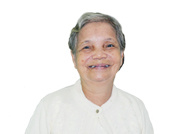 < Is she a cancer patient or not?>
< Is she a cancer patient or not?>
From: Ho Chi Minh, Vietnam
Case: Left Ovarian Cancer with Peritoneal Metastasis
Last June 2011 was the 1st visit of 76 year old patient to Modern Cancer Hospital Guangzhou. At this time is her 5th visit. For 1 1/2 year of continuous treatment, she had 60 Iodine Seed Implants in the ovary + 6 sessions of Interventional Treatment. The patient stated that “results shows improvement every time; tumor size shrinks each time. I felt my life now is no different with normal person. I always tell other people: Look, I’m a role model, when there’s illness, make sure to treat it right away!”......read
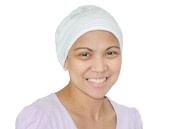 Minimally Invasive Treatment Gave Me a New Life!
Minimally Invasive Treatment Gave Me a New Life!
From: Philippines
Case: Poorly differentiated invasive cervical cancer
Nausea, hair loss, weight loss, repeated high fever and pain were the adverse reactions to patient’s treatments in the Philippines and Hong Kong. This made her decide to choose a new hospital to minimize pain and sufferings as much as possible. At Modern Cancer Hospital Guangzhou, she underwent Iodine Seed Implantation, a minimally invasive treatment which she had never heard of. By the end of the 3rd session, majority of her tumor disappeared as well as the pain......read
I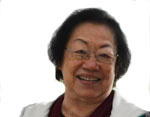 n Just Four Days, I Started a New Life!
n Just Four Days, I Started a New Life!
From: Indonesia
Case: Right Breast Invasive Ductal Carcinoma
“My family has genetic history of cancer, Ever since I found out that I have a small lump on my breast, I can’t sleep and even loss my appetite. After undergoing treatment, I was as thin as a match. Since I had a brother who had tongue cancer, who also happened to be a patient of Modern Cancer Hospital Guangzhou for 5 years is very healthy and always at my side. That time, I went to the hospital with him for treatment. I didn’t noticed when the doctors implanted the 10 Seed Particles inside my body. I just heard their bustling sounds. After two years of cancer treatment, I’m thankful to God that I can enjoy life.”......read
If you have any questions, please contact us via online consultation, email or phone call. If you find our website useful, please follow our FaceBook and YouTube, health information will be updated regularly.



